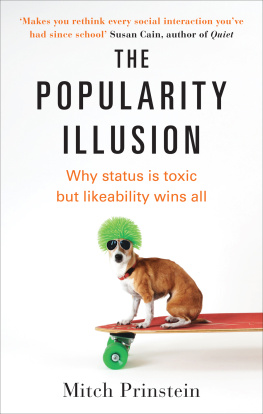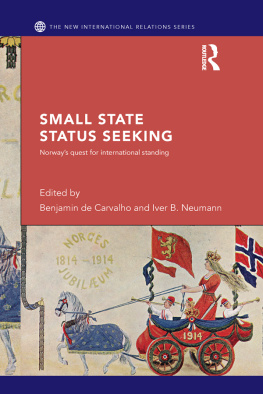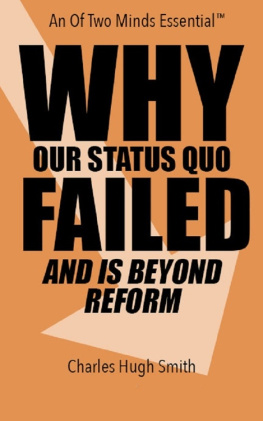THE RUSSELL SAGE FOUNDATION
The Russell Sage Foundation, one of the oldest of Americas general purpose foundations, was established in 1907 by Mrs. Margaret Olivia Sage for the improvement of social and living conditions in the United States. The foundation seeks to fulfill this mandate by fostering the development and dissemination of knowledge about the countrys political, social, and economic problems. While the foundation endeavors to assure the accuracy and objectivity of each book it publishes, the conclusions and interpretations in Russell Sage Foundation publications are those of the authors and not of the foundation, its trustees, or its staff. Publication by Russell Sage, therefore, does not imply foundation endorsement.

LIBRARY OF CONGRESS
CATALOGING-IN-PUBLICATION DATA
Names: Ridgeway, Cecilia L., author.
Title: Status : why is it everywhere? why does it matter? / Cecilia L. Ridgeway.
Description: New York, New York : The Russell Sage Foundation, [2019] | Includes bibliographical references and index.
Identifiers: LCCN 2019022886 (print) | LCCN 2019022887 (ebook) | ISBN 9780871547842 (paperback) | ISBN 9781610448895 (ebook)
Subjects: LCSH: Social stratification. | Social status. | Equality. | Power (Social sciences)
Classification: LCC HM821 .R47 2019 (print) | LCC HM821 (ebook) | DDC 305DC23
LC record available at https://lccn.loc.gov/2019022886
LC ebook record available at https://lccn.loc.gov/2019022887
Copyright 2019 by Russell Sage Foundation. All rights reserved. Printed in the United States of America. No part of this publication may be reproduced, stored in a retrieval system, or transmitted in any form or by any means, electronic, mechanical, photocopying, recording, or otherwise, without the prior written permission of the publisher. Reproduction by the United States Government in whole or in part is permitted for any purpose.
The paper used in this publication meets the minimum requirements of American National Standard for Information SciencesPermanence of Paper for Printed Library Materials. ANSI Z39.48-1992.
Text design by Linda Secondari.
RUSSELL SAGE FOUNDATION
112 East 64th Street,
New York, New York 10065
10 9 8 7 6 5 4 3 2 1
ABOUT THE AUTHOR
CECILIA L. RIDGEWAY is Lucie Stern Professor in the Social Sciences, Emerita, in the Sociology Department at Stanford University.
ACKNOWLEDGMENTS
I WANT TO thank the Center for the Advanced Study of the Behavioral Sciences at Stanford University for a stimulating fellowship year in 20122013, when I formed the initial idea of writing a book in order to come to terms with the subtle but pervasive power of status processessomething I had studied for most of my academic career but which remained, in a deep way, slightly mysterious, not just to me but to other scholars. After my year at CASBS, I had the idea of pursuing this project and some notes. But it was an invaluable sabbatical year as a visiting scholar at the Russell Sage Foundation in New York in 20162017 that actually gave me the time and intellectual support needed to do the real, focused work of working through the ideas and writing core chapters. RSF put me in the company of some wonderful scholars, gave me a beautiful office, and said, Do it. This book simply never would have happened without that support, and I am very grateful to the foundation for that. RSF gave me a generous fellowship, but I must also thank the deans of the School of Humanities and Sciences at Stanford for the additional financial support that made it possible for me and my partner, Robert N. Parker, to relocate to New York City for ten months. And speaking of Rob Parker, it was always his voice saying, You can do it, when I was in the wilderness on this project that actually got me through. Finally, I want to thank three very thoughtful reviewers, who took the time to give me expert comments, and Suzanne Nichols, RSFs publications director, who helped me work with this feedback to greatly improve the manuscript. We never do things alone, but only with and through all these others.
CHAPTER 1
WHAT IS STATUS AS A FORM OF INEQUALITY?
WE SEE STATUS virtually everywhere in social life, if we think to look for it. It suffuses everyday possessions, the cars we drive, the clothes we wear, the food brands we prefer, and the music we listen to. More significant aspects of our lives are equally marked by status, like the neighborhood we live in, our occupation, or our educational background. Even the organizations we work for carry more or less status value, as we can be acutely aware when we describe them to others. Think about what is at stake, for instance, in how you will be viewed at a social gathering when someone asks, What do you do anyway? Whether we like it or not, status is also attached to our social identities, like our sex, race or ethnicity, age, and social class background. And of course, in every interpersonal group we enter, implicit (or explicit) status differences quickly emerge and we find ourselves ranked up or down in the process.
Why is status everywhere? Why does it matter if it is? Defined simply, status is a comparative social ranking of people, groups, or objects in terms of the social esteem, honor, and respect accorded to them. But what is status really? That is, why does status develop and how does it work? What is its significance for our lives?
Notice that I said, We see status everywhere... if we think to look for it. Oddly enough, we usually do not think about it, at least not explicitly, even though it permeates our lives. And if we do knowingly think about status, we dont often credit it with much consequence. We think of it as a relatively trivial aspect of social life, a social vanity. And yet, people give every appearance of being deeply motivated by status concerns. Teenagers look for respect on the streets, as do CEOs in the boardroom. A fatherboasts about my daughter the lawyer. Billionaires care about their public status as one of the worlds richest people, above and beyond the exchange value of their massive fortunes. Why is this? What is the nature and power of status as a social processthat is, as something people do? And what is the nature and power of status as a form of social inequalitya structure of advantage and disadvantage that shapes peoples life outcomes? What is the significance of status for broader patterns of inequality in an advanced industrial society such as the contemporary United States? These are the core questions that this book addresses.
In taking on these questions, my goal is to make a case for what I refer to as the deep story behind status as a form of social inequality. Rather than providing a descriptive review of empirical research on status hierarchies or offering a how-to guide for attaining status, I want to inquire into the fundamental nature of status as a form of inequality distinct from more familiar forms of inequality based on power or wealth. What is it and why do we do it? Or better, howaccording to what processesdo we do it? To answer these questions, I develop a conceptual account of what I claim underlies status hierarchies and status evaluations. Although my goals are analytical, I develop this account out of a close consideration of current empirical research on status processes. I further attempt to show how my account of what status is, at root, helps explain some of its distinctive characteristics: that it is everywhere in social life, affecting individuals and groups alike, and that it is an ancient form of inequality that nevertheless interpenetrates modern meritocratic institutions. I also argue that it plays a unique and powerful role in the creation and maintenance of durable patterns of inequality based on social differences such as gender, race, and social class.














